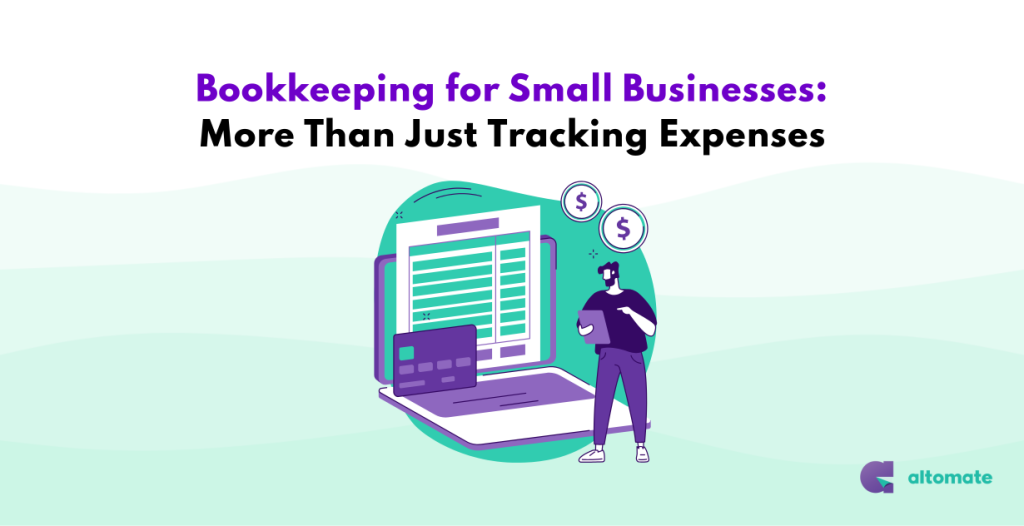
Reading Time: 4 Minutes
Many small business owners think bookkeeping is just about tracking expenses and ensuring the numbers add up. But the truth is, bookkeeping plays a far more significant role for small businesses than just balancing the books. It’s the foundation of informed decision-making, business growth, and financial health. Companies can run into cash flow problems, tax issues, and missed opportunities without proper bookkeeping.
The True Role of Bookkeeping in Small Businesses
Bookkeeping is the foundation of any successful business. It helps track financial transactions and ensures businesses remain legally compliant and financially healthy. Many small business owners overlook bookkeeping as an administrative burden, but it plays a crucial role in decision-making, growth planning, and risk management.
1. Tracking Financial Health
Bookkeeping helps businesses monitor their financial standing. By maintaining accurate income, expenses, and profits records, companies can measure performance, identify revenue trends, and detect any financial red flags before they escalate. For example, if a business notices declining profits despite steady revenue, it may indicate rising operational costs that must be addressed. Proper bookkeeping helps business owners understand where their money is going. Maintaining accurate financial records gives businesses a clear picture of revenue, expenses, and profitability.
2. Ensuring Compliance
Malaysia’s tax laws require businesses to maintain proper financial records. Without detailed bookkeeping, you risk penalties, audits, or non-compliance with GST and corporate tax regulations.
3. Cash Flow Management
Cash flow is the lifeblood of any small business. Proper bookkeeping helps monitor incoming and outgoing cash, ensuring businesses have enough liquidity to meet expenses. Many small businesses fail due to poor cash flow management rather than a lack of profitability. By keeping track of outstanding invoices, payment schedules, and operational costs, companies can prevent cash shortages and plan for future investments. Managing cash flow is crucial for small businesses. With effective bookkeeping, you can monitor receivables and payables to avoid liquidity issues.
4. Supporting Business Growth
Whether you’re applying for a loan or seeking investors, having well-maintained financial records boosts your credibility. Lenders and investors want to see a clear financial history before committing funds.
5. Better Budgeting & Forecasting
Budgeting is critical for managing a business’s financial health, and bookkeeping provides the data necessary for effective budgeting. Small business owners can analyze past income and expenditures to create realistic financial projections. With well-maintained books, businesses can allocate funds efficiently, avoid unnecessary spending, and prepare for future expansions or downturns. Accurate bookkeeping helps business owners plan for the future. You can forecast future expenses, income, and investments by analysing past financial records.
Essential Bookkeeping Practices for Small Businesses
1. Maintain Accurate Records
Accounting software or a professional bookkeeping service can help keep records error-free and up-to-date.
2. Separate Personal & Business Finances
A dedicated business bank account prevents confusion and clarifies financial transactions.
3. Track Expenses Diligently
Every business expense should be documented and categorised correctly to ensure accurate tax deductions.
4. Schedule Regular Financial Reviews
Reviewing financial reports helps spot trends, catch errors, and make informed decisions.
5. Leverage Professional Bookkeeping Services
Outsourcing to bookkeeping experts can save time, reduce errors, and ensure compliance with Malaysian regulations.
Choosing the Right Bookkeeping Solution
The right bookkeeping method depends on business size, complexity, and available resources. Small businesses must decide between manual bookkeeping, accounting software, hiring an in-house bookkeeper, or outsourcing to professionals. Here’s a deeper look at each option:
- Manual Bookkeeping: Suitable for small businesses with minimal transactions but prone to errors and time-consuming.
- Accounting Software: Tools like Xero, QuickBooks, or MYOB automate financial management and provide valuable insights.
- In-House Bookkeeper: A good option for businesses with high transaction volumes, but it can be costly to maintain a full-time employee.
- Outsourced Bookkeeping Services: Hiring professionals ensures accuracy, compliance, and efficiency, allowing business owners to focus on growth.
Small businesses can opt for:
- DIY Bookkeeping – Using accounting software like Xero or QuickBooks.
- In-House Bookkeeper – Hiring an employee to manage finances.
- Outsourced Bookkeeping Services – Working with professionals to ensure accuracy and compliance.
Bookkeeping Is the Backbone of Your Business
Bookkeeping for small businesses goes beyond simple number-crunching—it’s about gaining financial clarity, staying compliant, and making strategic decisions for growth. By implementing proper bookkeeping practices, small business owners can safeguard their financial future and drive sustainable success.
Looking for expert bookkeeping solutions? Explore Altomate’s Bookkeeping Services and let us handle your business finances while you focus on growth. You could also contact Altomate for a free consultation or to connect with our specialists today.








